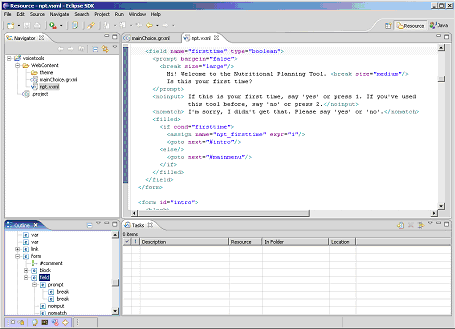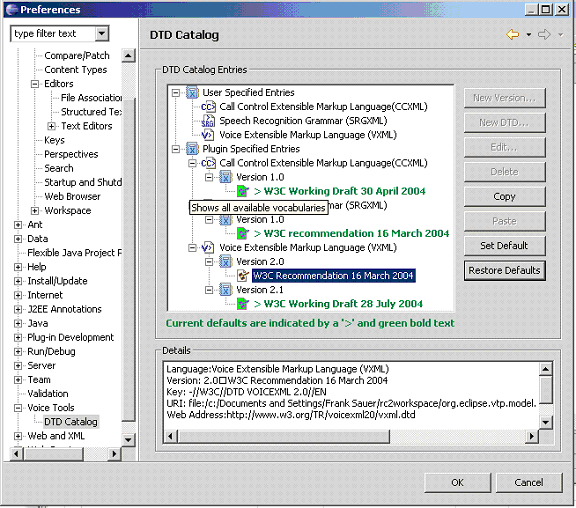|
The Eclipse Voice Tools Project
By Andrew Wahbe and Brent Metz
Introduction
In the speech business, amazing innovation takes place every day. Much of this innovation occurs in the area of voice development tools. In addition to the novel and differentiating features that result from these advances, tools vendors must also provide a set of baseline functionality that allows them to provide customers with a complete voice tooling solution. Unfortunately, companies must spend a disproportionate amount of their development time on these common, baseline features. The result is an incredible overlap between tooling vendors on function and wasted development time creating tools which simply do not create revenue or enhance the customer experience over competitor’s offerings.
The Eclipse Voice Tools Project brings the speech industry together to solve this problem by creating a set of open source tools users can freely take advantage of and companies can freely extend in their own products. By working together on one set of tools, each company’s development effort can be saved for building innovative tooling that enhances the customer experience and differentiates it from its competitors.
About Eclipse and the Voice Tools Project
The Eclipse platform is an open-source framework for building desktop tools that can interoperate within a single integrated environment. The default Eclipse download, available at http://www.eclipse.org/, provides a comprehensive Java development environment; however, many other Eclipse-based tools are available either from commercial vendors or open-source efforts. The Eclipse Foundation manages many projects developing open-source tools that are based upon the Eclipse framework in addition to managing the development of the Eclipse platform itself.
The Voice Tools Project depends on and extends the Eclipse Web Tools Platform Project, a set of open source tooling for web development. This allows it to build upon existing open source contributions to perform tasks such as deploying an application to an application server or constructing SQL queries, and to take advantage of all the other rich editing functions Eclipse provides. So what’s available? An initial contribution of code earlier this year extended the Web Tools XML editors to allow the creation and editing of SRGS XML, VoiceXML and CCXML documents. The software can be downloaded from the Voice Tools Project web site at http://www.eclipse.org/vtp/.

Figure 1. A VoiceXML document being edited by the Eclipse Voice Tools Project plugins.

Figure 2. The Voice Tools Project contains an extensible set of DTDs to customize each editor.
Much is left to be done in order to build a truly robust voice development environment in the open source space. Areas of future development include interpretation of VoiceXML, grammar testing, tuning tools and audio management. As the state of the art continues to move forward in the speech community so too will the tools in the Voice Tools Project.
The Value Proposition for Tools Vendors
The value proposition for a tooling provider to be involved with the Voice Tools Project is quite high. By pooling the industry’s resources into a common set of extensible tools, each individual contributor’s overall development effort is significantly reduced. For example, the tasks of maintaining currency with markup revisions and resolving platform compatibility issues can be spread across an entire industry instead of duplicated by each company’s team of developers.
Tooling vendors can also take advantage of the interoperability Eclipse’s extension point system affords. An extension point is essentially an API that a tool exposes so that other tools can use or build upon its features. By working with the Voice Tools Project, vendors can help define extension points that allow their tools to work seamlessly with both the open-source products as well as tools from other vendors. Voice tools could not only interact with each other, but also with any other tool plugged into the Eclipse framework.
The Value Proposition for Users
The biggest winners in the Voice Tools Project are the users of speech tooling. Besides creating a great set of open source tools, the project encourages companies to invest in more innovative tooling to make developing speech applications an even more compelling experience. The project also advocates the use of common, well-defined extension points to give the users unheard of flexibility to ‘plug in’ functionality that they obtain separately from other vendors or even write themselves. For example, a great visual design tool from Company A could be used alongside a great analysis tool from Company B, all in conjunction with a speech recognition engine provided by Company C.
Conclusion
The Eclipse Project’s Java development environment has become the de-facto standard amongst Java developers, providing a suite of robust tools that some of the largest companies in the world trust to extend for their leading development products. The Voice Tools Project aims to replicate their success in the speech application development world by providing a suite of robust speech tooling. The benefits to tooling vendors and end users are compelling.
|

